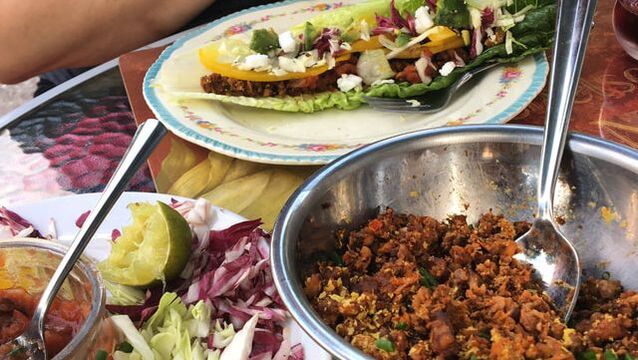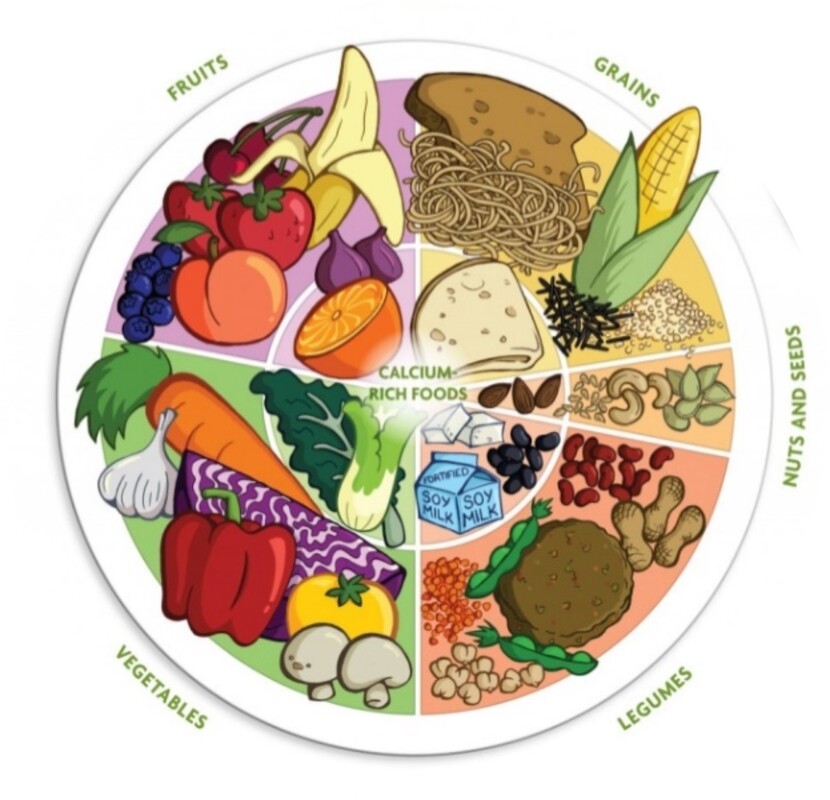Years ago I wrote the article below on eating a vegan diet. Now, more appropriately eating this way is coined, a 'whole-food, plant-based diet'. It means just that;
Eating 'whole' foods from the plant world.
I'll clarify upfront - this way of eating has been going on a long, long time, and it has nothing to do with the current climate agenda and push to eat bugs, nor GMO faux meats. I am all for eating real-food, made from real ingredients in a real kitchen, prepared by a chef/cook and not in a factory by scientists manipulating products deemed as ingredients and concocting fake food or food created from insects. This is not what I advocate in any way. With sustainable, regenerative farming practices and working with nature, we take super care of our environment.
Now, if you wish, please continue to read on for the article from 2018 (with updated information and statistics) emphasizing the need to consume a balanced, whole-food diet and just what this means. If you are leaning into eating plant-based, this is info you need to know.
Such a funny expression we humans use :+) “I turned vegan”.
There is so much stigma and massive misunderstanding about the global shift to eating more plant-based foods. Numbers doing so are increasing world-wide.
Today's stats, thanks to the article in World Animal Foundation, share...
According to Stats of 2023, There Are Approximately 88 Million Vegans in the World. (The VOU)
You’ve likely heard it time and time again, ‘Oh yeah, I tried “going vegan” it didn’t work for me.’ While a statement such as this may have been a true experience for this person, the question begs to be answered…
What does eating a vegan diet mean for them? What foods did it consist of?
Was it a balanced, nutrient dense, whole foods diet?
Were meals made up of sufficient plant based proteins, quality carbs, healthy fats and adequate fiber in appropriate amounts for their present state of health, activity levels/lifestyle?
Calling something vegan or vegetarian doesn’t automatically give it an elite status or free pass to ‘healthy’. Just as the ‘organic’ or 'gluten-free' or 'low fat' or 'heart healthy' label on foods doesn’t assure you it’s a healthy food choice.
Potato chips and junk food, be they vegan, gluten free, organic or not, don’t make for a healthy dietary choice. I see many plant-based eaters adamant about being completely vegan in their life approach, yet consume a diet of vegan fast food such as poutine, pizza, mac n cheese, hot dogs, and doughnuts.
While well-meaning, this depicts those likely driven to a vegan lifestyle due to ethical reasons foremost and not overall health and well-being. This way of eating invites in criticism and doubt on the health benefits of shifting to a plant based diet. No fast food or extreme dietary approach works well and it can lead to serious health issues.
There is a great deal of misunderstanding when it comes to defining / determining a vegan diet. The newer term for this approach to eating is ‘plant-based’ or ‘plant-strong’ and it means a diet of a wide variety of ‘whole’ or minimally processed foods.
Sure we can eliminate all animal products from our diet yet a healthy vegan dietary approach (like any particular approach) must still include the essential nutrients. In our human habit of putting labels on life, let’s stop for a moment and talk about a well-balanced, whole-foods-centered, dietary approach that comes from the plant kingdom. Diets are a funny thing. We all need our very own. NO one fit works for us all yet there are some basics to guide you. Read on:
What a nutrient dense, real-food vegan diet needs to contain:
Essential macro nutrients:
- Sufficient intake of plant-based proteins such as a variety of legumes/beans/pulses, nut/seeds, ancient, whole-food grains, organic tempeh/tofu/natto, shiitake/wild mushrooms.
- Protein rich, quality carbs (such as ancient grains like buckwheat, wild rice, faro, freekeh, millet, quinoa, sorghum, pearl barley)…
- Produce – fresh, raw and cooked and lots of them in the form of leafy greens, root and cruciferous vegetables, celery, asparagus, cucumbers, etc., and fruits of all kinds. Variety is essential for a full spectrum of nutrients.
- Adequate hydration with clean water
Essential micro nutrients many fall short on many diets:
Ensure sufficient intake of all the necessary vitamins and minerals with a focus on:
- Vit D
- Vit B12 and all the B vitamins spectrum
- Omega 3 fatty acids from foods such as flax, chia and hemp seeds as well as leafy greens and a micro algae supplement
- Sea vegetables for iodine and omega 3’s
- Zinc and Vit K2 are also suggested for those eating a vegan diet
- Iodine
- Magnesium
- Calcium (this can be an issue as well - best is food sources such as greens, beans, seeds like sesame and chia, almonds, organic soy, etc. and these deliver iron as well).
Mainstream media news of the benefits of eating plant strong is now more accepted than ever with the science to support it. If it resonates with you, consider transitioning to a plant based diet, just be sure to do it well and access the full spectrum of nutrients via food and augment with supplements as needed.
Working with a qualified (nutrition educated) health practitioner is recommended.
Regular MD's and GP's are rarely your best resource for nutrition information.
The Vegetarian Society
Food Revolution and more...
Info on Supplements can be found here
Thanks for your time reading. My aim is to help you take better care of yourself.
Teri Gentes
Helping people implement a healthy lifestyle that begets optimal wellness with health promotion and disease prevention is a mission for me. I help you determine what works best for you and enable that transition with sustainable, enjoyable practices.
Contact me for personal, family and group coaching as well as corporate presentations.



 RSS Feed
RSS Feed